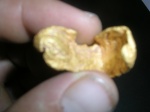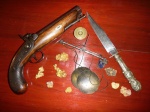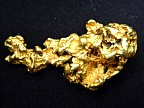GPX4500 - Finding Mineralization in Quartz
5 posters
Page 1 of 1
 GPX4500 - Finding Mineralization in Quartz
GPX4500 - Finding Mineralization in Quartz
Hi! I am new to the forum and have a question regarding the GPX (I own a 4500) and hard rock gold: Given a sensitive coil like the Commander 8" mono, could a GPX detect the presence of disseminated gold in rock and give a clear target single - or would this always sound like mineralised ground to the GPX? For example, the rock might be some sort of sedimentary rock that had sulphide mineralisation plus gold spread through it. There would be no visible nuggets but very fine mineralisation right through the rock. I'm not thinking here about the traditional quartz with gold veins type ore.
Unfortunately I don't have any ore samples yet to try this out on but I'm wondering not only if it's possible but at what kind of grade a GPX reacts. For example, many Australian mines are processing ore in the 3 or 4 grams a ton range but ores can of course be much higher. I'm guessing very low grades always sound like general mineralisation.
Obviously, once the ore gets to a very high grade and the rock starts acting like one big nugget then maybe a GPX would give a clear target signal. But I'm wondering where the cut-off is for that to happen.
A further issue is the best coil to do this with. Does anyone think a bigger coil (perhaps a DD) would be better suited to detect such gold mineralisation. I'm guessing that if the gold mineralisation is buried in the ground then a bigger coil would be better.
I considered that a GB2 and probably a Falcon probe might be better tools to confirm that rock is carrying gold but I just have the GPX.
Unfortunately I don't have any ore samples yet to try this out on but I'm wondering not only if it's possible but at what kind of grade a GPX reacts. For example, many Australian mines are processing ore in the 3 or 4 grams a ton range but ores can of course be much higher. I'm guessing very low grades always sound like general mineralisation.
Obviously, once the ore gets to a very high grade and the rock starts acting like one big nugget then maybe a GPX would give a clear target signal. But I'm wondering where the cut-off is for that to happen.
A further issue is the best coil to do this with. Does anyone think a bigger coil (perhaps a DD) would be better suited to detect such gold mineralisation. I'm guessing that if the gold mineralisation is buried in the ground then a bigger coil would be better.
I considered that a GB2 and probably a Falcon probe might be better tools to confirm that rock is carrying gold but I just have the GPX.

Strindberg- New Poster

- Number of posts : 5
Age : 64
Registration date : 2009-07-01
 Re: GPX4500 - Finding Mineralization in Quartz
Re: GPX4500 - Finding Mineralization in Quartz
This beer is good.
Last edited by gollstar on Fri Jan 07, 2011 10:56 pm; edited 1 time in total

gollstar- Contributor Plus

- Number of posts : 697
Registration date : 2009-04-15
 Re: GPX4500 - Finding Mineralization in Quartz
Re: GPX4500 - Finding Mineralization in Quartz
Thanks for the reply. I was really interested in the GPX's abilities to detect gold in non-quartz based mineralisation. The kind of mineralisation you might find at say, the Kalgoorlie super-pit.

Strindberg- New Poster

- Number of posts : 5
Age : 64
Registration date : 2009-07-01
 Re: GPX4500 - Finding Mineralization in Quartz
Re: GPX4500 - Finding Mineralization in Quartz
This beer is good..
Last edited by gollstar on Fri Jan 07, 2011 10:57 pm; edited 1 time in total

gollstar- Contributor Plus

- Number of posts : 697
Registration date : 2009-04-15
 Re: GPX4500 - Finding Mineralization in Quartz
Re: GPX4500 - Finding Mineralization in Quartz
sorry just checked on some facts it was 60 ounces to the bucketful if you would believe.reading things like that can make many a man have a restless night.

gollstar- Contributor Plus

- Number of posts : 697
Registration date : 2009-04-15
 Re: GPX4500 - Finding Mineralization in Quartz
Re: GPX4500 - Finding Mineralization in Quartz
Strindberg wrote:Thanks for the reply. I was really interested in the GPX's abilities to detect gold in non-quartz based mineralisation. The kind of mineralisation you might find at say, the Kalgoorlie super-pit.
IMO not a chance, any PI would never do it. Would not even make a signal on any coil even with the 5x10" DD or round 6" Mono. VLF's with a DD are much better at detecting small gold amounts in rock. Get a higher frequency Fisher Gold Bug-2(71 kHz), Whites GMT(48 kHz), or Minelab Eureka Gold(set at 60 kHz) if you want any chance to do that, then it might not even work. Or that Falcon set at even at a much higher kHz but a very small probe is the problem. A DD is hotter up close than a Mono up to about 5", then after that the Mono is hotter, according to Steve Ghoulson's tests.
Beer Beeper- Contributor Plus

- Number of posts : 252
Registration date : 2008-12-15
 Re: GPX4500 - Finding Mineralization in Quartz
Re: GPX4500 - Finding Mineralization in Quartz
Hi Strindberg
The answer is a no with that question.
Sounds like a job for the Ebay Special gold probe with calculator processor.
The whites GMT has a Mineral type readout with a consentration meter also which may be of use and being a VLF will be more suitable for what you are trying to achieve
Regards Mark
The answer is a no with that question.
Sounds like a job for the Ebay Special gold probe with calculator processor.

The whites GMT has a Mineral type readout with a consentration meter also which may be of use and being a VLF will be more suitable for what you are trying to achieve
Regards Mark

MS- Contributor Plus

- Number of posts : 791
Age : 58
Registration date : 2009-03-17
 Re: GPX4500 - Finding Mineralization in Quartz
Re: GPX4500 - Finding Mineralization in Quartz
Thanks for the replies! I really appreciate the feedback. I guess my question could be rephrased as "could a GPX be used to detect very high grade gold ore".
The consensus from you guys seems to be "No" but I'm wondering if there isn't some very high gold grade when the GPX starts to think it's getting a response from a very big nugget. Perhaps a grade in the region of 100 to 300 grams per ton - but still gold mineralisation that is finely and evenly disseminated throughout the rock. Surely the GPX would give some response even if it was like a ground mineralisation response?
The consensus from you guys seems to be "No" but I'm wondering if there isn't some very high gold grade when the GPX starts to think it's getting a response from a very big nugget. Perhaps a grade in the region of 100 to 300 grams per ton - but still gold mineralisation that is finely and evenly disseminated throughout the rock. Surely the GPX would give some response even if it was like a ground mineralisation response?

Strindberg- New Poster

- Number of posts : 5
Age : 64
Registration date : 2009-07-01
 Re: GPX4500 - Finding Mineralization in Quartz
Re: GPX4500 - Finding Mineralization in Quartz
Hi Strindberg
Just keep in mind that the reason the minelab PI detectors are so good is that thay can and are designed to ignore those type of signals with the ground balancing.
What they do is balance out hot rocks and mineralisation and only target solid metal.
Mark
Just keep in mind that the reason the minelab PI detectors are so good is that thay can and are designed to ignore those type of signals with the ground balancing.
What they do is balance out hot rocks and mineralisation and only target solid metal.
Mark

MS- Contributor Plus

- Number of posts : 791
Age : 58
Registration date : 2009-03-17
 Re: GPX4500 - Finding Mineralization in Quartz
Re: GPX4500 - Finding Mineralization in Quartz
But if I turn the GPX ground balancing off would I then not have a tool that could indicate a significant gold concentration in a rock? My impression of the GPX ground balancing is that the signal processor is subtracting a background noise signal to give me the 'balanced' signal. With fixed balancing I lift the coil up and down over an area and say ' this is the mineralisation that has to be subtracted'. Tracking starts off that way but seems to try and guess how the original background noise is changing. Without balancing it justs tells me whatever it detects but pure gold always seem to give me a clear target signal.

Strindberg- New Poster

- Number of posts : 5
Age : 64
Registration date : 2009-07-01
 Re: GPX4500 - Finding Mineralization in Quartz
Re: GPX4500 - Finding Mineralization in Quartz
Strindberg wrote:But if I turn the GPX ground balancing off would I then not have a tool that could indicate a significant gold concentration in a rock? My impression of the GPX ground balancing is that the signal processor is subtracting a background noise signal to give me the 'balanced' signal. With fixed balancing I lift the coil up and down over an area and say ' this is the mineralisation that has to be subtracted'. Tracking starts off that way but seems to try and guess how the original background noise is changing. Without balancing it justs tells me whatever it detects but pure gold always seem to give me a clear target signal.
I know a guy who everynow and again finds these types of rocks that have fine gold spread out or in a bit of a clump in part of a large rock (you can't really tell other than panning it off bit by bit). The signal is usually faint sometimes it can sound reasonable. He gets these with his old 14 x 7.5 nf which they don't make anymore. I wonder if there is a small coil which is as good?

Shinegold- Contributor Plus

- Number of posts : 238
Registration date : 2008-12-04
 Re: GPX4500 - Finding Mineralization in Quartz
Re: GPX4500 - Finding Mineralization in Quartz
Well I have a commander 8" and that pretty sensitive. I would assume the Coiltek 6" is even more sensitive. So you think with a really sensitive coil it could work if there is sufficient gold?

Strindberg- New Poster

- Number of posts : 5
Age : 64
Registration date : 2009-07-01
 Similar topics
Similar topics» Finding a Quartz Blow and boulders of Quartz
» Black Quartz in reefs, oldtimers called it MAGPIE QUARTZ
» Removing Quartz From Gold In Quartz Specimens
» Older gpx4500 versus newer version gpx4500
» Mineralization?
» Black Quartz in reefs, oldtimers called it MAGPIE QUARTZ
» Removing Quartz From Gold In Quartz Specimens
» Older gpx4500 versus newer version gpx4500
» Mineralization?
Page 1 of 1
Permissions in this forum:
You cannot reply to topics in this forum